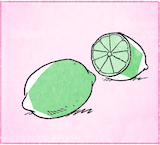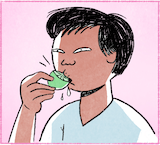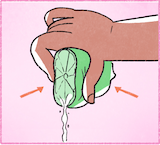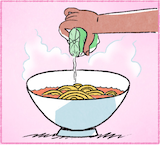



นี้คืออี่หยัง นี้คือบักนาว
บักนาวน่วยสีอี่หยัง บักนาวน่วยสีเขียว
บักนาวน่วยใหญ่บ่ บ่ บักนาวน่วยบ่ใหญ่ บักนาวน่วยน้อยๆ
บักนาวมันมีลดซาดจั่งใด บักนาวมันมีลดซาดส้มหลาย บักนาวมันส้มบักคักหนึ่ง ส้มกะด้อกะเดี้ย
น้ำบักนาวมีไว้เฮ็ดหญัง น้ำบักนาวมีไว้ถ้าปุงอาหาน น้ำบักนาวมีไว้ถ้าต้มน้ำเป็นยาสะหมุนไพกะได้
10
เขากำลังเฮ็ดหญัง เขากำลังกัดกินบักนาว
เขากัดกินบักนาวเฮ็ดหญัง บ่ลู้คือกัน เขาอาดสิอยากซิมบักนาวกะได้ ว่ามันส้มหลือบ่ส้ม
เขากัดกินเข้าไปแล้วมันส้มบ่ กะหน้าสิส้มอยู่ เพาะว่าเบิ่งสีหน้าของเขาแล้วเป็นตาส้มหลาย เป็นตาส้มบักคัก เป็นตาส้มกะด้อกะเดี้ย
บักนาวอยู่ในมือเขามีหลายบ่ บ่ บักนาวอยู่ในมือเขามีเปี่ยงเดียว หลือมีเคิ่งน่วย
11
เขากำลังเฮ็ดหญัง เขากำลังบีบบักนาว
เขาบีบบักนาวเฮ็ดหญัง เขาบีบบักนาวเพื่อที่สิเอาน้ำบักนาวออกมา
เขาสิเอาน้ำบักนาวไปเฮ็ดหญัง เขาอาดสิเอาน้ำบักนาวไปปุงอาหาน หลือไปเฮ็ดแนวกินกะได้
เขาใซ้อี่หยังบีบบักนาว เขาใซ้มือของเขาบีบบักนาว
เขาบีบบักนาวหลายบ่ บ่ เขาบีบบักนาวเคิ่งน่วย
12
เขากำลังเฮ็ดหญัง เขากำลังบีบน้ำบักนาว
เขาบีบน้ำบักนาวไปใส เขาบีบน้ำบักนาวใส่ถ้วยกวยเตียว
เป็นหญังเขาคือบีบน้ำบักนาวใส่ถ้วยกวยเตียว เขาอาดสิกินส้มหลือกินเปี้ยว เขากะเลยบีบน้ำบักนาวใส่ถ้วยกวยเตียว
มีกวยเตียวจักถ้วย มีกวยเตียวถ้วยเดียว
กวยเตียวมันแซบบ่ แซบอยู่ กวยเตียวมันอาดสิแซบหลาย
Link to overview page
Link to dictionary
| Isaan | Pronunciation | Tones | Thai | English/Notes |
|---|---|---|---|---|
| นี้ | ni: | HF | นี้ | 1. this 2. here |
| คือ | khʉ: | HR | คือ | 1. to be, to resemble, like, as 2. why {บักหล้าคือบ่เก็บโต่ะแน่ = [addressing a young boy] Why haven't you cleared the table?} |
| อี่หยัง | i:-yaŋ | H-M | อะไร | 1. what {นี้คืออี่หยัง = What is this?} {มื้อนี้เจ้าเฮ็ดอี่หยัง = What are you doing today?} {กินเข้างายกับอี่หยัง = What did you have for breakfast?} 2. something, anything, (in negations) nothing {บ่ต้องเฮ็ดอี่หยังอีกเลยนอกจากใส่ปุย = [we] don't need to do anything besides adding fertilizer} |
| บักนาว | bak-na:o | M-HR | มะนาว | lemon, lime |
| น่วย | nu:ai | H | ลูก, ผล | clf. for the fruits (e.g., banana, coconut, lime, papaya, watermelon), vegetables (e.g., chilis), eggs, mountains, the sun |
| สี | si: | M | สี | 1. color 2. colored pencil, crayon |
| เขียว | khi:ao | M | เขียว | green |
| ใหญ่ | ɲai | H | ใหญ่ | large, big |
| บ่ | bɔ: | H | ไม่ | 1. no, not 2. question particle, transforming a statement into a question Notes: spelling exception in line with common usage on social media |
| น้อย | nɔ:i | HF | น้อย | 1. few, little 2. small |
| มัน | man | HR | มัน | it (also used to refer to people) |
| มี | mi: | HR | มี | 1. to have 2. there is |
| ลดซาด | lot-sa:t | H-HF | รสชาติ | taste Notes: pronunciation: also realized as ลดชาด |
| จั่งใด | jaŋ-dai | H-M | ยังไง, แบบไหน | how, in what manner {บักนาวมันมีลดซาดจั่งใด = Lime fruits have what kind of taste?} {เขาปิดแอจั่งใด = How is he switching off the A/C?} {เทียนใซ้จั่งใด = How's a candle used?} {สิใซ้จั่งใด = how is [it] used?} |
| ส้ม | som | LF | เปรี้ยว | sour {บักนาวมันส้มบักคักหนึ่ง = lime fruits are really sour} |
| หลาย | la:i | M | เยอะ, มาก | many, much, very |
| บักคักหนึ่ง | bak-khak-nʉŋ | M-H-H | intensifier: very, very much (variant of คัก) | |
| กะด้อกะเดี้ย | ga-dɔ:k-ga-di:a | M-HF-M-HF | มากมาย, มากเกินไป | intensifier: very, very much |
| น้ำ | na:m | HF | น้ำ | 1. water 2. drink, soft drink, juice |
| ไว้ | wai | HF | ไว้ | 1. to keep, to put, to place, to retain, to save, to reserve {เขาเอาหัวของเขาไว้ใส = Where does she put her head?} {หมาสิเลี้ยงไว้บ้าน = dogs are kept/raised in the house} {ไก่เลี้ยงไว้ในคอก = chicken are kept/raised in a coop} {หน้ามันบังไว้ = the face is covered/not visible} {เขาเอาโทละสับวางไว้หู = he holds the phone to his ear} 2. for {นาลิกาปุกมีไว้เฮ็ดหญัง = What is an alarm clock for?} {หม้อเอาไว้เฮ็ดแนวกิน = a pot is used to make food} {ก่องเอาไว้เฮ็ดหญัง ก่องเอาไว้ใส่ของ = What is the box for? It's for putting in stuff.} Notes: see also ไว้ถ้า |
| เฮ็ด | het | H | ทำ | to do, to make |
| หญัง | ɲaŋ | M | อะไร, เป็นหญัง = ทำไม | 1. what {เขากำลังเฮ็ดหญัง = What is he doing?} {ธูปเอาไว้เฮ็ดหญัง = What are incense sticks for?} 2. something, anything, (nothing) 3. เป็นหญัง[...]คือ in initial position: why {เป็นหญังเขาคือใส่บักพิกลงไปในกวยเตียว = Why is he putting chili in [his] noodle soup?} {เป็นหญังหน้าต่างมันคือเปิด = Why is the window open?} {เป็นหญังมันคือมีควนไฟ = Why is there smoke?} |
| ไว้ถ้า | wai-tha: | HF-LF | usually in a positive statement or answer: is for, is used for, has the purpose of {กะทะมีไว้ถ้าทอด = a pan is for frying} {น้ำบักนาวมีไว้ถ้าปุงอาหาน = lime juice is used to season food} {ปากกามีไว้ถ้าเขียน = a pen is for writing} {กะเทียมเอาไว้ถ้าเฮ็ดแนวกิน = garlic is used to make food} {ขาเอาไว้ถ้าญ่าง = legs are for walking} {เกิบเอาไว้ถ้าใส่ = shoes are for wearing} Notes: see also ไว้ |
|
| ปุง | puŋ | M | ปรุง | to season, to flavor, to cook, to mix, to combine {ปุงกาแฟ = to season coffee, i.e., to add sugar} {ปุงกวยเตียว = to season noodle soup (e.g., with chili, fish sauce, vinegar, sugar etc.)} |
| อาหาน | a:-ha:n | M-M | อาหาร | food {ญุงมันกินเลียดเป็นอาหาน = the mosquito feeds on blood} |
| ต้ม | tɔm | HF | ต้ม | to boil |
| เป็น | pen | M | เป็น | 1. to be, to exist 2. to be able to 3. to suffer, sth. happens to 4. เป็นหญัง[...]คือ in initial position: why? {เป็นหญังเขากะคือแปงฟัน = Why is he brushing his teeth?} {เป็นหญังเคี่ยงบินมันคือสิตก = Why is the airplane falling down?} |
| ยา | ya: | M | ยา | 1. medicine 2. drug |
| สะหมุนไพ | sa-mun-phai | M-M-HR | สมุนไพร | herb, medicinal herbs |
| กะ | ga | M | ก็ | 1. then, consequently 2. also |
| ได้ | dai | HF | ได้ | 1. can 2. to get, to obtain 3. before verb: indicating past tense 4. บ่ได้ + verb: not |
| เขา | khao | M | เขา | personal pronoun: he, she |
| กำลัง | gam-laŋ | M-HR | กำลัง | auxiliary indicating continuous or progressive action |
| กัด | gat | M | กัด | to bite |
| กิน | gin | M | กิน | to eat, to consume, to use |
| ลู้ | lu: | HF | รู้ | 1. to know 2. to understand Notes: equivalent to ฮู้ |
| คือกัน | khʉ:-gan | HR-M | เหมือนกัน | 1. also, likewise, similarly {ยินดีที่ได้ฮู้จักคือกันคับ = Nice to meet you too!} 2. in negative sentences: either {บ่ลู้คือกัน = I don't know either} {จักคือกัน = I don't know (either)} |
| อาด | a:t | LF | อาจ | 1. might, may, will 2. likely |
| สิ | si | M | จะ | future tense auxiliary {เขากำลังสิตื่น = he's about to wake up} {สิไปตะหลาด = [I'm] going to the market} |
| อยาก | ya:k | LF | อยาก | to want, to wish |
| ซิม | sim | HR | ชิม | to taste, to try |
| ว่า | wa: | H | ว่า | 1. that, as {คำว่า X = the word X} 2. to say |
| หลือ | lʉ: | M | หรือ | or |
| เข้า | khao | LF | เข้า | to enter, to go inside, to come/go in/on {เข้าห้องน้ำ = to go to the bathroom} {เข้านอน = to go to bed} {ขี่เลียเข้าไปเกาะ = to take a boat to go on an island} |
| ไป | pai | M | ไป | 1. to go 2. auxiliary indicating action extending into the future |
| แล้ว | lɛ:o | HF | แล้ว | 1. finished 2. already 3. and then, and next (especially แล้วกะ) 4. auxiliary for past tense |
| หน้า | na: | LF | หน้า | 1. front {ปะตูหน้า = front door} 2. face {เขากำลังล้างหน้า = he's washing his face} 3. auxiliary: conditional tense {เขาหน้าสิเป็นพุบ่าวพุสาวกัน = they are probably groom and bride} {กะหน้าสิส้มอยู่ = it's likely to be sour} 4. season {หน้าฮ้อน = hot season} 5. page 6. clf. for pages {เฮาอ่านฮอดหน้านั้นแล้ว = we've read until this page} |
| อยู่ | yu: | H | อยู่ | 1. to be (located) at 2. yet, still 3. auxiliary indicating continuous or progressive action {ทอดปาอยู่ในกะทะ = (in the process of) frying a fish in the pan} {แม่กำลังเมี้ยนเฮียนอยู่ = mother is cleaning/tidying up the house} |
| เพาะว่า | phɔ-wa: | H-H | เพราะว่า | because |
| เบิ่ง | bəŋ | H | ดู | 1. to look at, to see, to watch {เบิ่งโทละทัด = to watch TV} {เบิ่งหนัง = to watch a movie} 2. to guess {เบิ่งซงแล้ว ... = [I] guess / from what it looks like ...} |
| สีหน้า | si:-na: | M-LF | สีหน้า | face, facial expression |
| ของ | khɔ:ŋ | M | ของ | of, belonging to |
| ตา | ta: | M | ตา | as a prefix: likely, worthy, fit for (like Thai น่า-) {ตาฮัก = lovely/cute} {ตาสะออน = praiseworthy} {ตาหวาน = (of ice cream) [likely to be] sweet} {ตาอยู่ = to be a good place to be} Notes: see also various entries for ตา-, e.g., ตาแซบ, ตาพู่ฮ้าย, ตาย้าน, ตาอยากหัว, ตาฮัก, ตามีแฮง |
| บักคัก | bak-khak | M-H | intensifier: very, very much (variant of คัก) | |
| ใน | nai | HR | ใน | in, within |
| มือ | mʉ: | HR | มือ | 1. hand 2. front leg/paw (e.g., of a cat) |
| เปี่ยง | pi:aŋ | H | ซีก, ชิ้น | piece, slice |
| เดียว | di:ao | M | เดียว | only, alone, single |
| เคิ่ง | khəŋ | H | ครึ่ง | half {เวลาห้าโมงเคิ่ง = half past five} {เขาบีบบักนาวเคิ่งน่วย = he's pressing half a lime fruit} |
| บีบ | bi:p | LF | บีบ | to squeeze, to press |
| เพื่อที่ | phʉ:a-thi: | H-H | เพื่อที่ | in order to, so that Notes: the vowel เอือ is likely to be a Thai loan |
| เอา | ao | M | เอา | to take, to give {เขากำลังเอาก่องไปซั่ง = he's taking the boxes to weigh them} {หมอกำลังเอายาให้คนป่วยกิน = the doctor is giving medicine to the patient} {เอาไว้ถ้า = is for, is used for, has the purpose of} |
| ออก | ɔ:k | LF | ออก | 1. to go out, to leave 2. out |
| มา | ma: | HR | มา | 1. to come 2. auxiliary expressing action towards the present or focal time {กะคุเฮ็ดมาจากอี่หยัง = What is the bucket made of?} {แล้วเขากะเก็บเงินจากพุนั้นมา = and then she takes the money of that person} |
| แนวกิน | nɛ:o-gin | HR-M | อาหาร | food {เฮ็ดแนวกิน = to prepare food} {ตำบักหุ่งเนี้ยกะสิเป็นแนวกิน = papaya salad is (a kind of) food} |
| ใซ้ | sai | HF | ใช้ | to use |
| ใส | sai | M | (ที่)ไหน | 1. where? {สิไปใส = Where are [you] going?} {มาแต่ใส = Where are [you] coming from?} {กะทะอยู่ใส = Where's the pan?} 2. somewhere, anywhere {ใสกะได้ = anywhere, wherever you like} |
| ใส่ | sai | H | ใส่ | 1. to put something in/on {เขาใส่บักพิกในกวยเตียวหลาย = he's putting a lot of chili in his noodle soup} {เขาบีบยาสีฟันใส่แปงสีฟัน = he squeezes toothpaste on the toothbrush} {ก่องเอาไว้ใส่ของ = boxes are there to put stuff in} 2. to wear (clothes) {เขาใส่เสี้ยแขนญาว = he's wearing a long-sleeve} 3. directed at {เอิ้นใส่กัน = to call each other/to say to each other} {หมามันเห่าใส่แมว = the dog barks at the cat} {ล้องเพงใส่ไม = to sing into the microphone} {เขากำลังซี้มือไปใส่พุซาย = she's pointing at the man} |
| ถ้วย | thu:ai | LF | ถ้วย | small bowl |
| กวยเตียว | gu:ai-ti:ao | M-M | ก๋วยเตี๋ยว | kind of noodle soup Notes: pronunciation: often with rising tones, especially in isolation |
| เปี้ยว | pi:ao | HF | เปรี้ยว | sour |
| เลย | lə:i | HR | เลย | 1. futher on, beyond, past {เข็มน้อยเลยเลขสิบสองไป = the minute hand has passed number twelve} 2. too much 3. at all 4. definitively 5. completely, utterly |
| จัก | jak | M | จัก | 1. answer to a question: [I] don't know, don't know exactly, [I'm] not sure {พุซายคนนี้เขาเถ้าไป่ จัก จักเถ้าหลือบ่เถ้า เบิ่งบ่ค่อยออก = Is this man here already old? I don't know. I can't see clearly whether he's old or not.} {เขาเว้ากันอยู่ใส จักคือกัน = Where are they talking? I don't know either.} 2. exact(ly), what exactly {จักต้มอี่หยังกะบ่ฮู้ = I don't know what (exactly) he is cooking} {บ่ลู้คือกันจักปาอี่หยัง = I don't know either what kind of fish this is} 3. how much/many? {ต้นไม้มีจักต้น = How many trees are there?} {ตอนนี้จักโมงแล้ว = What time is it now?} {มือของเฮานี้สิมีจักนิ้ว = How many fingers do our hands have?} 4. a bit, a little bit {จักหน่อย/จักหน่อยหนึ่ง = a bit, a little bit} |
| แซบ | sɛ:p | HF | อร่อย | 1. food: tasty {กวยเตียวมันแซบบ่ = Is the noodle soup tasty?} 2. sleep: well {เป็นตานอนแซบคัก = it looks as if she's sleeping very well} |